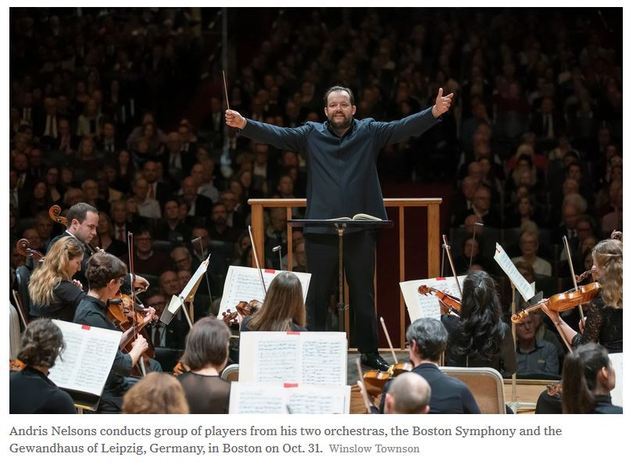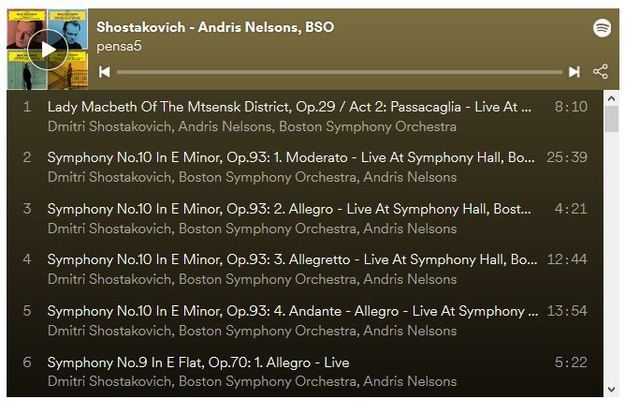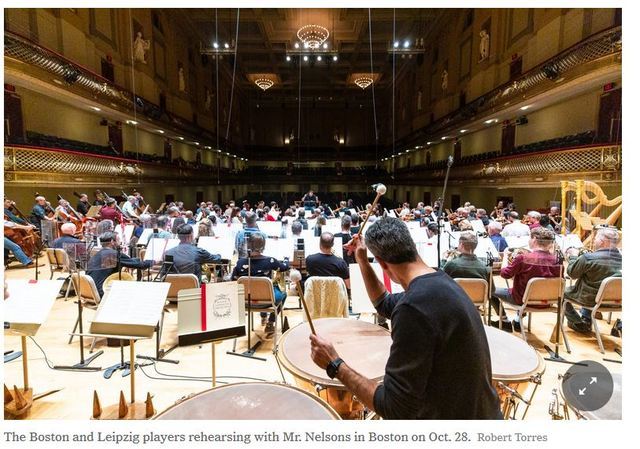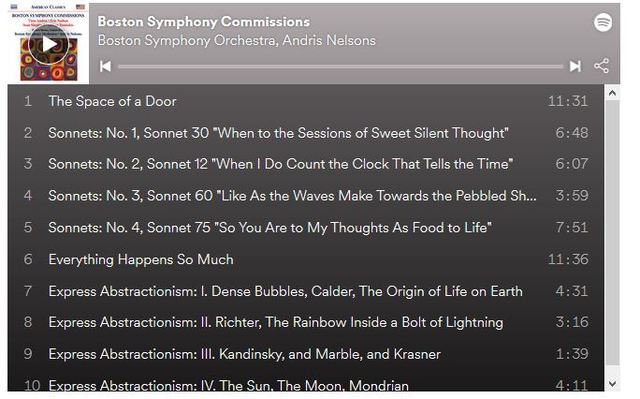



There are many audio clips if you can get to the site. Regards, Len
At the Boston Symphony, Andris Nelsons Still Seeks an Identity
Now in his sixth season with the orchestra, an acclaimed conductor struggles to define his mission.
By David Allen
Nov. 15, 2019
BOSTON — What is the mission of the Boston Symphony, the most generously endowed orchestra in America?
We are six seasons into Andris Nelsons’s tenure as music director of this storied ensemble, which appears at Carnegie Hall on Monday, but the answer to that question is still unclear.
When he arrived in September 2014, Mr. Nelsons, then just 35, was a young, safe, healthy pair of hands after the drama of James Levine, who had stepped down in 2011 after years of illness and cancellations.
Mr. Nelsons has led plenty of good performances — some very good — and has produced a number of fine recordings, including an ongoing Shostakovich survey that has rightly won him three Grammy Awards. Though his tenure has not been without controversy — including some frictions generated by an overhaul of the Tanglewood Festival Chorus and persistent issues surrounding the orchestra’s commitment to gender parity — two years ago I wrote that “there is probably no current music director in the country I would rather hear conduct on a weekly basis than Mr. Nelsons.”
Now I am not so sure. As orchestras from Los Angeles to New York stride forward into the 21st century, and ensembles in Cleveland and Pittsburgh set new standards in the music of centuries gone by, Mr. Nelsons’s Boston Symphony seems content simply to abide. Supporting new music without really championing it, and advocating the canon without really innovating within it, his orchestra is lately taking so few programmatic and interpretive risks that it sounds a bit lost.
Part of the problem is that Mr. Nelsons is still trying to pin down his own musical identity. His style is not demonstrative, nor overtly shaped — the aim seeming to be to make things appear as uninterpreted as possible.
Sometimes that works, as in a memorable pairing of Beethoven’s Fourth and Fifth symphonies a year ago; in the Strauss that peppers programs; and, above all, in opera, in which he seems most comfortable. Even there, showing no interest in aping the innovative operatic stagings put on by the Cleveland Orchestra or the New York Philharmonic, he has stuck to concert performances, none of which — not even his formidable if noncommittal accounts of Wagner — have come close to a sensational “Elektra” at Carnegie Hall four years ago.
Mr. Nelsons’s reluctance to take a point of view, and his reliance instead on the undoubtable competence of his players, has become wearing. An old-school “Christmas Oratorio” of Bach last November could have made a statement, but turned out to have nothing to say. His Mahler has become particularly frustrating, as in a wary “Resurrection” Symphony last October, an unsteady Third in January 2018, and the “most by-the-book reading possible” of the Fifth, as my colleague Joshua Barone put it, last November.
The result is that I often come out of a Nelsons concert thinking that it was admirable, but rarely feeling shaken or stirred.
What is especially odd is that there is no doubt this conductor can live up to his glowing reputation in the standard repertoire. Boston proved it by inviting Mr. Nelsons’s other orchestra to perform at Symphony Hall.
Since 2017, Mr. Nelsons has split his time between Boston and Leipzig, Germany, where he serves as chief conductor of the Gewandhaus Orchestra. Early concerns that the arrangement would detract from his commitment to Massachusetts have proven unfounded, and the two orchestras have made the most of their modest maestro by plotting a partnership that has led to special programs in both cities, co-commissions, musician exchanges and educational offerings.
The alliance started slowly, but it picked up at the end of October, when the Gewandhaus arrived for two concerts of 19th-century repertoire, plus three joint appearances with the Boston players. If the merged appearances were of dubious musical value, the Gewandhaus’s own concerts were more revealing.
With Mr. Nelsons at the helm of an ensemble offering more Old World heft, any doubts were blown away. Possessing an antique sound colored darkest walnut, and throwing their whole bodies into communicating with one another and with the audience, the Leipzig players enthralled with their innate sense of phrasing, their variety and unity of attack, their use of every inch of hair on their bows, their ability to invest each bar with dramatic meaning.
The conductor’s avowedly anti-didactic, deliberately neutral style came sensationally alive. And I found myself asking where that spirit has been in Boston of late.
The orchestra continues to click with many of the guest conductors who take up the podium when Mr. Nelsons is away. Excelling like past guests such as François-Xavier Roth, Gustavo Dudamel and Sakari Oramo, Susanna Malkki has found remarkable depth this season in Debussy’s “La Mer” and other French music, and Dima Slobodeniouk has brought vigor to Sibelius and Nielsen. Their programs also had the benefit of being more carefully put together than Mr. Nelsons’s, which have become puzzlingly incohesive.
And the composer and conductor Thomas Adès’s quirky tenure as the orchestra’s “artistic partner” is a reminder that if Mr. Nelsons has stalled in the old, he is also a less than thrilling spokesman for the new. By the end of this season, he will have given 17 world or American premieres at Symphony Hall, all of a more or less conventional kind, as can be heard on a Naxos disc of commissions released this month. His work in this area has been more promising than many expected but still, you sense, dutiful.
Only two of those premieres have been by women — though guest conductors are doing more this season, and there will be new pieces by Sofia Gubaidulina and Julia Adolphe next season. But that problem is worsened further by Mr. Nelsons’s incuriosity about expanding our sense of the past, Shostakovich’s clunkers notwithstanding. He has learned his Copland and his Bernstein, but if even Riccardo Muti and the Chicago Symphony Orchestra feel moved to perform Florence Price these days, what have Mr. Nelsons and the Boston Symphony got to lose by doing right by their city’s own, overlooked Amy Beach?
Money, apparently. When local musicians met with Symphony Hall authorities in December 2017 to ask them to diversify their programming, The Boston Globe reported that one of the responses they received, beyond a plea for time, was that market research suggested that changes could not be made “without alienating significant portions of our audience and affecting the BSO’s well-being.”
Given that the orchestra sits on net assets of well over half a billion dollars and just raised $70 million to open the lovely new Linde Center for Music and Learning at Tanglewood, such timidity ought to worry anyone who cares about what was once among the most progressive orchestras in the world.
The question isn’t whether the Boston Symphony can afford to recover its pioneering spirit, but whether, with resources other orchestras can only dream of, it can afford not to.
Mr. Nelsons, who will probably sign a contract extension beyond 2022, will have to decide what he wants. Will he be the Koussevitzky of today, and take his place among the greatest and most visionary of the Boston Symphony’s directors, or will he merely preside over complacency?
https://www.nytimes.com/2019/11/15/arts ... lsons.html